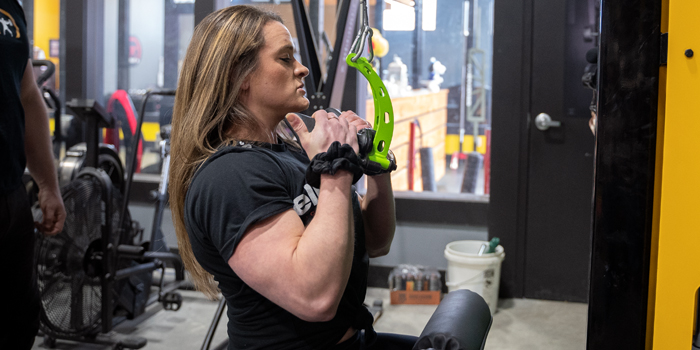
Us meatheads are obsessed with the physical, and rightly so, since powerlifting wouldn’t be much of a sport without it. That said, if we stop there, we’re leaving one massively important tool untouched—the mind. Roman emperor Marcus Aurelius understood this well when he said, “You have power over your mind, not outside events. Realize this, and you will find strength.” He probably wasn’t thinking of powerlifting when he said this, but the principle works just as well under the bar as anywhere else. Perhaps better.
Your battle to succeed in powerlifting (or any other endeavor) is won or lost in your mind long before you chalk up and curl your fingers around the knurling of a barbell. Successful lifters understand this, having learned through bitter experience that when the mind isn’t engaged, the body won’t be either.
Most of us have heard this concept before, having been bombarded with enough of social media’s cheesy inspirational tidbits superimposed on black and white gym photos to last a lifetime. Annoying as these materials are, the concept itself is not to be ignored. Former World’s Strongest Man and deadlift world record holder Eddie Hall has a video on YouTube where he describes the process he underwent in preparation for pulling 500 kilograms. His training didn’t really change. Most of the video is a detailed description of the extreme lengths he went to conditioning his mind to reject failure as a possibility.
If you’re anything like myself and most other serious lifters, your body and its ability to perform is already pretty good. How about your mind? If you think you’ve been slacking on the cerebral stuff, keep reading for three specific mental strategies you can put into practice in training and competition right away.
1. Visualize Training and Meets Ahead of Time
When your goal is to get stronger through barbell-based training, the main thing you must do is keep adding weight to the barbell. When you’re a novice, this is relatively easy. It gets harder after a few years of training and some significant strength gains. Still, if you’re eating enough, lifting properly, and genuinely want to get stronger, you can continue to do so for many years, barring serious injury.
Wanting to get stronger is a surprisingly important part of the equation. It’s not enough to want to get stronger only when you’re in the gym, either. Performing your training successfully in your mind before you ever set foot in the gym becomes increasingly important the longer you’ve been a gym rat. You won’t get any stronger if you don’t add weight to the bar, and the more strength you’ve gained already, the harder this is to continue. That’s why it’s important to clearly visualize your workouts ahead of time, planning out each set and rep before you ever unrack a weight.
Imagine yourself performing all your working sets successfully, and you’re far more likely to do so in real life. Formulate particular goals about the weight you want to lift and the number of repetitions you’d like to achieve. Think about these numeric goals for as long as possible prior to your workout. Will yourself to achieve them.
This might sound like psychobabble, but I can tell you from experience these mental visualization techniques really work. Years ago when I was still relatively skinny and weak, I was approaching my first ever 400-pound squat attempt. I imagined myself doing it for a full week before squat day. I pictured every aspect of the session: warm-up sets, incrementally heavier working sets, and finally, the big squat itself. I was so strongly tuned in to the idea of squatting this weight successfully, there was no way I could fail. Squat day came, and I squatted 405 for two reps. Had I not been so prepared mentally, I’m sure that weight never would have left the rack. Since then, I’ve continued to use this method to lift much heavier weights.
2. Develop Unshakable Self-Belief
It might seem strange just how much your thoughts affect your abilities in the gym. Most novices think of a heavy barbell workout as nothing more than a physical act, albeit a difficult one. It’s more than that. Once you’ve advanced beyond the easy and fast progress that comes with being a novice, self-belief becomes absolutely critical.
You can picture yourself successfully lifting the weight you have in mind until you’re blue in the face, but unless you genuinely believe you can and will do it, chances are the barbell won’t come up when you want it to. If you’ve done all the training required to lift a particular weight, the determining factor will be your level of self-belief.
Again, this might sound like psychological fluff, but experienced lifters will know what I’m talking about. If you allow yourself to doubt, even for a moment, that you’re capable of lifting a particularly challenging weight that you’ve set as your goal, your chances of failure increase dramatically. On the other hand, imagining yourself unracking that weight, straining and struggling, then defying gravity to the point where all the reps you set out to perform are completed in your mind vastly increases your chances of making it happen for real.
Supreme self-confidence is a trait shared by many successful athletes, and the reason is simple. In order to lift monstrously heavy weights, run a blisteringly fast 100 meter dash, or jump higher than anyone else, elite athletes have no option but to develop bulletproof self-belief. If you want to get strong, do the same.
3. Commit to the Lift No Matter What
Planning a challenging training session is all well and good, but if you don’t have ironclad resolve to stick with your plan, the plan is worthless. How do I know? Because I’ve spent plenty of time straining under a heavy barbell. When you’re putting everything you have into a workout, your mind will most definitely tell you that you’ve reached your limit before you really have. This is particularly true in higher reps sets when you’re training to failure. Doing a heavy set of 8, 10, or 12 repetitions on the squat can feel like running a marathon with weights tied around your ankles.
This is where a solid commitment to completing the set comes in. Without this commitment, you’ll almost certainly listen to your mind telling you you’ve reached your limit at rep 8, when in reality, you could’ve ground out reps 9 through 12. There’s a vast (although sometimes difficult-to-discern) difference between a hard, painful task, and an impossible one.
If you’re training intelligently, 9 times out of 10 the weights, reps, and sets you prescribe yourself won’t be beyond your physical capabilities. Your mind will most likely lie to you, and tell you they are. Don’t listen. Particularly heavy or high-volume sets will cause you to feel this effect more strongly. You may even have to make a mid-rep decision on whether you’ll continue grinding, or allow the weight to win and crush you. Decide ahead of time that option 2 is never an option.
Robert Maxwell is a competitive powerlifter and online strength coach hailing from rural Canada. He specializes in helping beginner and intermediate lifters reach their strength potential. When not in the gym or on the competition platform, he works as a writer and videographer. Robert lives in a cabin he built in the woods with his wife and daughter. Want to hire Robert as your coach? Visit www.maxwellstrength.com.










